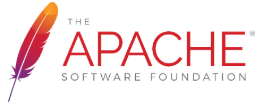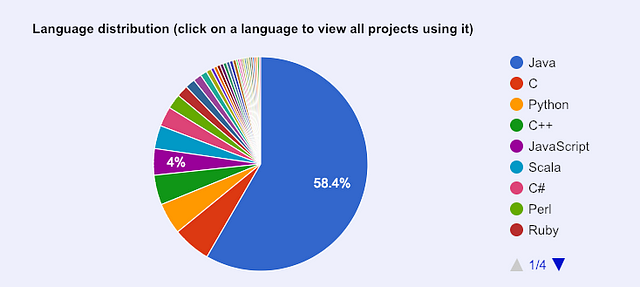

The Unsung Heroes of Modern Software Development
source link: https://www.tuicool.com/articles/hit/Rfiiaa3
Go to the source link to view the article. You can view the picture content, updated content and better typesetting reading experience. If the link is broken, please click the button below to view the snapshot at that time.

Ready to learn Big Data Analytics?Browse courseslike Big Data - What Every Manager Needs to Know developed by industry thought leaders and Experfy in Harvard Innovation Lab.
Open Source Software Foundations Everyone Should Know
Open source computing is hugely important to software development. It is the model that everyone benefits from. The open source foundations that support this development play a crucial role. However, their work often goes unnoticed. I had no idea until I research this article that so many projects benefited from these foundations. Let’s see the who’s behind many of the tools software developers and data scientists use every day.

Exploring the landscape of open source foundations
Why Open Source Foundations?
Open source foundations have emerged to help sustain and manage open source projects. These foundations provide space for companies and people with a stake in an open source software (OSS) project to come together. Their status as independent, nonprofit entities provides neutral ground for competing companies to work together.

Foundations support the things that get build on top of them
Open source foundations often provide a wide range of business and operational support for software development projects. By falling under the umbrella of the foundation, the project can often receive financial support and back-office assistance. Foundations can help these specific ways:
- negotiate and sign supplier contracts
- employ staff or contractors
- buffer legal risks
- provide legal frameworks (many foundations have created their own licenses)
- provide technical services such as code signing certificates
- access financial products such as bank accounts
- provide marketing services such as press releases
- provide oversight and governance
- manage project membership
As you can imagine, these are invaluable roles for a project’s leaders to have assistance with. The foundations help the project’s members keep their focus on fixing bugs, writing documents, and developing new features. Read more about the roles open source foundations play here .
Open Source Foundation Leaders
I’ll highlight six open source foundations that are key to many important projects. For each foundation I’ll give a brief bio, provide the number of projects being supported as of early 2019, and highlight some well-known projects. Note that these groups fall under various IRS classifications for charitable and trade organizations — not all are technically foundations.
Apache Software Foundation

The Apache Software Foundation is 20 years old and is one of the largest foundations. As of early 2019 it has over 350 open source initiatives.
The ASF provides an established framework for intellectual property and financial contributions that simultaneously limits potential legal exposure for our project committers. Through the ASF’s meritocratic process known as “The Apache Way,” more than 730 individual Members and 7,000 Committers successfully collaborate to develop freely available enterprise-grade software, benefiting millions of users worldwide: thousands of software solutions are distributed under the Apache License; and the community actively participates in ASF mailing lists, mentoring initiatives, and ApacheCon, the Foundation’s official user conference, trainings, and expo.

Many Apache projects are Java heavy. Popular projects include: Apache HTTP Server, Hadoop, Tomcat, and Arrow.
Linux Foundation

The Linux Foundation is the home of the Linux operating system and many related projects. Some of its other 100+ projects include NodeJS and RethinkDB.
The Linux Foundation supports the creation of sustainable open source ecosystems by providing financial and intellectual resources, infrastructure, services, events, and training. Working together, The Linux Foundation and its projects form the most ambitious and successful investment in the creation of shared technology.
The Linux Foundation was founded in 2000 as a merger of two other groups. It currently has over 1,000 members, including all the usual big name technology companies.
All hosted projects get governance structure and back-end resources. Some projects also get funding. The Linux Foundation also provides training and conferences.
Free Software Foundation

Launched in 1983, the Free Software Foundation maintains the projects that make up the GNU Linux ecosystem. Other popular projects include Bash, Emacs, Gawk, Make, and R.
The Free Software Foundation (FSF) is a nonprofit with a worldwide mission to promote computer user freedom. We defend the rights of all software users.
The Free Software Foundation has over 5,000 members and about 400 OSS projects.
Software Freedom Conservancy

The Software Freedom Conservancy was founded in 2006. It has over 45 projects including such popular ones such as Busybox, Git, Homebrew, Inkscape, phpMYAdmin, PyPy, and Selenium.
Software Freedom Conservancy is a not-for-profit charity that helps promote, improve, develop, and defend Free, Libre, and Open Source Software (FLOSS) projects. Conservancy provides a non-profit home and infrastructure for FLOSS projects. This allows FLOSS developers to focus on what they do best — writing and improving FLOSS for the general public — while Conservancy takes care of the projects’ needs that do not relate directly to software development and documentation.
The Software Freedom Conservancy has over 500 sponsors, including Google and some other big names.
Software in the Public Interest

Software in the Public Interest was founded 1997. Its 39 projects include haskell, PostgrSQL, Jenkins, Arch Linux, and Debian.
Software in the Public Interest is a non-profit organization which was founded to help organizations develop and distribute open hardware and software. Our mission is to help genuine, substantial, and significant free and open source software projects by handling their non-technical administrative tasks so that they aren’t required to operate their own legal entity.
Cloud Native Computing Foundation (CNCF)
The Cloud Native Computing Foundation is the new kid on the block. Founded in 2015, it supports open source projects around Kubernetes containerized cloud microservices.
CNCF is an open source software foundation dedicated to making cloud native computing universal and sustainable. Cloud native computing uses an open source software stack to deploy applications as microservices, packaging each part into its own container, and dynamically orchestrating those containers to optimize resource utilization. Cloud native technologies enable software developers to build great products faster.
CNCF members include a who’s who of tech: AWS, AlibabCloud, Dell, Intel, Oracle, Microsoft Azure, IBM Cloud, and Google Cloud.
As of early 2019, 4 projects have graduated and 16 are incubating. Popular associated projects include Kubernetes, which has graduated from CNCF.
Interestingly, CNCF is supported by the Linux Foundation.
NumFOCUS

NumFOCUS is the home of many popular data science open source projects. It was founded in 2012 and its 25 popular projects include NumPy, Matplotlib, Pandas, Jupyter, Julia, and Bokeh. NumFOCUS also promote many other open source projects as affiliated projects.
NumFOCUS offers many programs in support of our mission to promote sustainable high-level programming languages, open code development, and reproducible scientific research.
NumFOCUS holds PyData conferences throughout the world. Disclosure: I’ve volunteered at PyData DC and had great time. I highly recommend volunteering! :smiley:
Those are the six open source foundations to know. They provide invaluable support to many of the open source software projects that make the world go round. Note that I didn’t include foundations that support a small number of projects or who have a more general advocacy focus.
Here’s the recap:
- Apache Software Foundation
- Linux Foundation
- Free Software Foundation
- Software Freedom Conservancy
- Software in the Public Interest
- Cloud Native Computing Foundation (CNCF)
- NumFOCUS
If you know of other organizations that provide support to many other OSS projects, please let me know in the comments or on Twitter @discdiver.
To learn more about open source foundations, see this research study .
Wrap
Now you know where to turn with your open source project when the time comes. You also know some of the folks to thank for enabling open source projects to grow effectively.
I hope you found this article to be informative. If you did, please share it on social media so others can find it.
I write about machine learning, data science, deep learning, cloud computing, Docker, open source software, and other fun stuff. Check out my articles here if any of that’s up your alley.
A big thank you to all who contribute to and support open source!
Recommend
-
 9
9
The unsung upsides of staying put Posted August 20, 2018 under ContinuousDelivery, XP
-
 10
10
Unsung Beauty of Analog Devices Datasheets Engineers build stuff. They need to put together complex systems, most often from pieces that others have built. I jokingly talk to my colleagues that software engineering is similar...
-
 8
8
News The Unsung Hero: Reference Designs from 3 Companies Aim to Inspire EEs Often overlooked, reference designs can be an EEs best friend. Maxim Integrated, STMicroelectronics, and Microchip aim to help design fac...
-
 6
6
By Nish Tahir in Engineering...
-
 12
12
What is agile methodology? Modern software development explained Everyone talks about agile development, but how does it really work? Get an overview of how teams co...
-
 5
5
UX in the 1990s: Amusing stories from unsung pioneersIncluding UX as an integral part of a project is a mainstream practice today, but that was not always so....
-
 8
8
Modern software development calls for automated API security
-
 6
6
HTML is such a simple language that most developers don't even consider it as a programming language, but today, we are going to go below the surface, and uncover 15 HTML tags that you can take advantage of toda...
-
 8
8
-
 7
7
Social Follow us on social media for more news, content, and background stories from our authors, editors, and events. Share your personal experience with us.
About Joyk
Aggregate valuable and interesting links.
Joyk means Joy of geeK